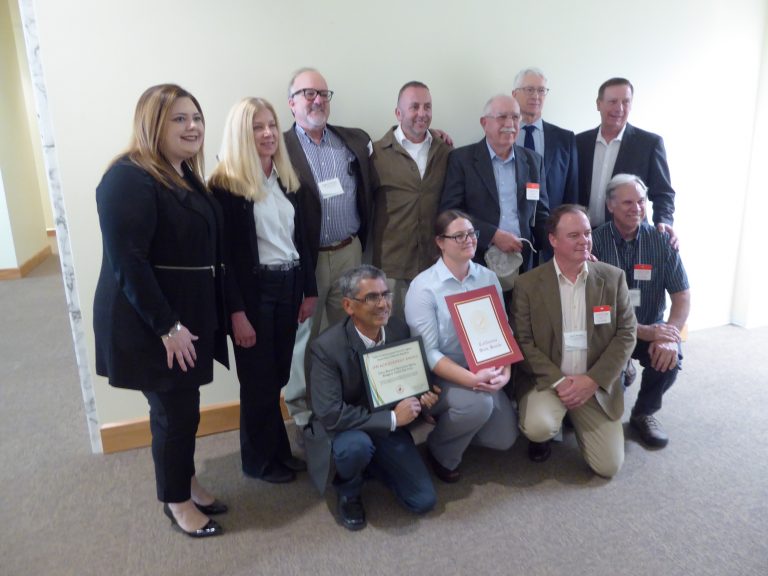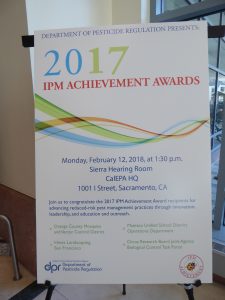
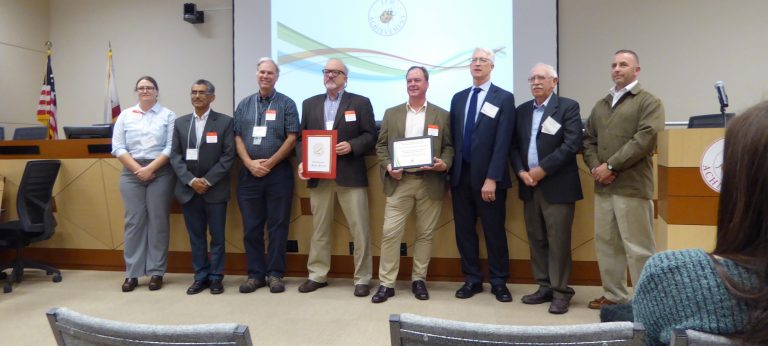
Mark Hoddle, Director, Center for Invasive Species Research, University of California Riverside
On 13 February 2018 at the California Environmental Protection Agency Headquarters in Sacramento, the Asian Citrus Psyllid Biocontrol Taskforce was awarded the Integrated Pest Management (IPM) Achievement Award for innovation and leadership by the Department of Pesticide Regulation.
Asian citrus psyllid (ACP) was first detected in California in 2008. It spreads a bacterium that causes a lethal citrus disease, huanglongbing (HLB), which was found in California in 2012. ACP-HLB have devastated citrus industries in Florida and Texas, and California citrus producers are extremely worried something similar will happen to California’s iconic $3 billion per year citrus industry. Currently, ACP-HLB reside almost exclusively on backyard citrus in urban areas of southern California.
In response to this invasive pest, a biocontrol taskforce team was put together by the Citrus Research Board. Under the auspices of the Citrus Research Board, the ACP Biocontrol Taskforce has representatives from the following organizations and public groups: University of California Riverside (UCR), University of Agriculture Faisalabad (Punjab, Pakistan), USDA-APHIS, USDA-CPHST, CDFA, CRB, commercial insectaries, professional pest control advisors, citrus growers, and home owners. The Taskforce meets 2-3 times per year, coordinates research activities across agencies, provides opportunities for updates on ACP biocontrol programs, and facilitates conversations, program planning, and priority/policy alignment across all stakeholder groups. The success and impact of the ACP Biocontrol Taskforce, in terms of IPM program development with the focus on the critical objective of reduced pesticide use has been significant.
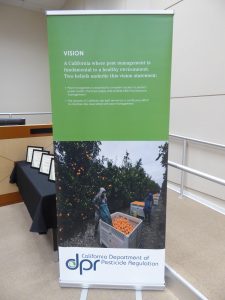
With the goal of reducing pesticide use for ACP management in urban areas, the priority of the taskforce was to develop a classical biological control (biocontrol) program for ACP in urban citrus in California with natural enemies imported from the home range of ACP (i.e., Pakistan). Foreign exploration with colleagues from the University of Agriculture Faisalabad in Punjab Pakistanresulted in the importation and release of two natural enemy species, Tamarixia radiata and Diaphorencyrtus aligarhensisin California. One of these natural enemies, T. radiata, established readily on ACP infesting urban citrus and spread quickly. Since the start of the biocontrol program targeting ACP, densities of this pest have declined substantially in many areas, perhaps as much as ~70% at some of the long term monitoring sites where ACP and natural enemy activity has been surveyed for three or more years. Research results strongly suggest that the Pakistani parasitoid, T. radiata and generalist predators, like syrphid fly larvae, contribute significantly to ACP mortality and have probably cause pest populations to diminish. These natural enemies are all self-sustaining, self-dispersing, self-regulating, pose zero environmental risk, and provide “free” ACP control 24/7/365!
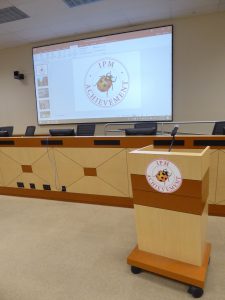
The impact of the biocontrol program on ACP populations in California, especially urban citrus has been considerable. ACP biocontrol is a permanent pest management tool that needs no day-to-day management. The natural enemies saves CA millions of dollars annually in ACP control costs. The biocontrol agents eliminated the need for thousands of gallons of pesticides to be applied to backyard plants that provide food to millions of California families.
To learn more about the DPR IPM Achievement awardees and their accomplishments in using integrated pest management, see the DPR press release.
